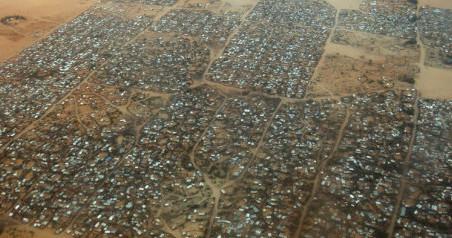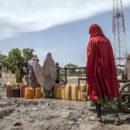In Memoriam: Jamali Hassan Jalal al Din
An obituary by Julie Flint and Alex de Waal.
One of the most disturbing images to have come out of Sudan in the wake of JEM’s attempt to overthrow the government has been that of the tortured body of a lawyer in his forties, Jamali Hassan Jalal al Din, apparently beaten to death by government forces after being captured some 50 kilometers south of Khartoum last weekend.
Almost as shocking as the image itself is the fact that the government saw no impediment to allowing the transmission, on television and in the print media, of evidence of what looks suspiciously like an extra-judicial execution. The official version of Jamali’s death is that he was killed in clashes with government troops on 12 May, together with 45 other rebels. Yet his body shows no sign of bullet or shrapnel wounds and there is no blood””or sand””on what can be seen of his clothes. His face, however, is grotesquely battered and swollen.
A second photograph published in a Khartoum newspaper shows a group of young rebels, apparently captured with Jamali. None of them are wounded, or show any signs of having been in a battle. The information JEM has been able to gather in what is still a chaotic situation suggests that Jamali was killed after””or during””interrogation.
We came to know and respect Jamali during the Darfur peace talks in Abuja. He was a member of JEM’s delegation in the power-sharing commission, and, although JEM ultimately rejected the agreement reached in Abuja, Jamali consistently played a constructive role in the negotiations. In the words of Gibril Ibrahim, brother of JEM chairman Khalil Ibrahim, he was “reliable, trustworthy, brave and sociable”””even with his enemies. On one occasion he insisted that Darfur warranted its own autonomous region, because Darfurians would not abuse one another. Across the room at the government table, Abdalla Safi al Nur retorted, “When I was governor I arrested you! And I’m a Darfurian!” Despite the two men’s history as adversaries, Jamali talked amicably with Safi al Nur afterwards and the two prayed together when the delegations assembled for prayers in the Chida Hotel.
Unlike most of the senior officials of JEM, Jamali was not a member of the Kobe branch of the Zaghawa. He belonged to the small Mima tribe and had gained a law degree from Nileen University. Like many Darfurians, Jamali supported the Popular Congress Party of Hassan Turabi in the 1990s, believing it might offer a new beginning for Darfur. In November 2004, in the second year of the rebellion, he left Khartoum to join JEM””drawn to it, in part, by a close personal friendship with Khalil Ibrahim. Although his official position in JEM gave him responsibility for presidential affairs, Jamalis’s main brief was justice. He was Khalil Ibrahim’s liaison with members of the Native Administration, whom Khalil personally urged to report any misdemeanours by his men. In the absence of official courts, Jamali established a code of punishment ranging from confiscation of thuraya telephone and gun, or one-to-three months’ imprisonment for theft, to a range of sanctions for rape.
Asked early in 2006 whether he had ever had to deal with a case of rape, he replied, with some embarrassment: “Not rape. Flirtation, on one occasion.” The punishment had been “a stern warning and an apology to the girl and her family”.
Jamali was an honest and upright man. He left a large family, including the children of his deceased brother for whom he was caring. In better circumstances his talents and good character would have allowed him to live out a full and peaceful life. He dedicated his life to a revolutionary struggle, convinced that Sudan could truly be a land of equality and justice. He deserved better than to die brutally in captivity. May his soul rest in peace.
The photograph of Jamali’s body published by the Sudan government can be seen on this link:
this-is-the-photo-of-jamali-hassan-jalaleldein1







For the record, the Government of Sudan insists that Jamali Hassan and his bodyguards were killed in a firefight. Given the conflicting versions of events, an independent investigation would be appropriate.
Alex and Julie —
Thank you so much for your thoughtful piece. I met Jamali several times in Abuja, Washington, D.C., and most recently in eastern Chad. He was, as you say, honest and trustworthy. And he was also very funny.
My favorite memory of Jamali was sitting with him and other members of JEM in a house in Abeche. We sat and ate dinner together and then talked about Darfur. It got late, it got dark, the lanterns went out, and the only lights we had were two flashlights: my cheap drug-store light and my travel companion’s (a good friend of Jamali) expensive camping store light. My friend vehemently insisted that we use his expensive light, but within seconds of turning it on the powerful beam began to dim until, quite quickly, it completely went out. Jamali caught my eye right before the room went black and began laughing hysterically. It was infectious and we all followed suit.
Jamali was a man of integrity in a situation where people with integrity are so desperately needed. He will be greatly missed.
Jamally is my classmate from primary school to high school. After Abuja agreement he was in the USA and I spoke with him and he was optimistic about the future prospect of peace and we chat about the size of our families, it turned out that he was a head me in every category. We promised to meet in DC but other commitments did not allow meeting him. He was eloquent and charming with good heart, character. I he was killed during an interrogation after his eyes was pocked. He left more than 7 children behind him. Indeed, it is a great loss for Darfur. So many in Elfasher have told me how their hearts were broken by his death. As Alex said in better circumstances his talents and good character would have allowed him to live out a full and peaceful life. Overall, he had charted beautiful course of life and he has no control of the eventuality. We ask the almighty to bestow him with his mercy.
Hamid E Ali,PhD
I met Jamally in Fort Wayne, IN . He a courageous Darfurian man. He lost his life because he believes that Darfur is his top priorty. I know that the brave man don’t kill who like Jamally. Shame on the Islamic Sudanese government. I demand JEM to revenge for what happened to Jamally.
This man was part of a terrorist organisation. He came to Omdurman to wreak death and destruction. The great majority of the Sudanese people have little sympathy for him. He died the way he intended for others.
We have had many expressions of condolence at the death of Jamali. Irrespective of their political allegiances, Sudanese and their friends mourn the passing of one of their own. Sudan has a fine tradition of putting political differences aside when it comes to personal matters and we should pay our respects to Jamali in this spirit.
This blog also encourages open and frank discussion and is run on the principle of freedom of expression–any contributions are attributable to their authors only. I should underline that neither I personally nor the SSRC as an institution support any calls for revenge. I also think it is mistaken to label JEM as a terrorist organisation.
I received the following tribute from Mohamed:
When I met Al-Jamali In the mid 90s he was a faithful and loyal member of the NIF and the NCP later. I was a student in the university. Al-Jamali, unlike his friends, was always tolerant, rational, trying to show the logic of things, indirectly, and silently, disapproving the regime’s harassment and the prosecution practiced mainly by the national security. This was not always praised by his friends. We saw in their eyes the confusion about how and why Al-Jamali accepted us and did nothing to stop us—on the contrary supporting us to continue the discussion night after night.
As far as I know Al-Jamali was one of the few followers and supporters of the NIF/NCP who did not depend primarily on it for their living either as civil/military servants or as businessmen getting contracts or facilitations from the government. Instead he joined his brothers in their small-scale trade between Darfur and Khartoum, which I know for sure did not flourish after he associated himself with JEM.